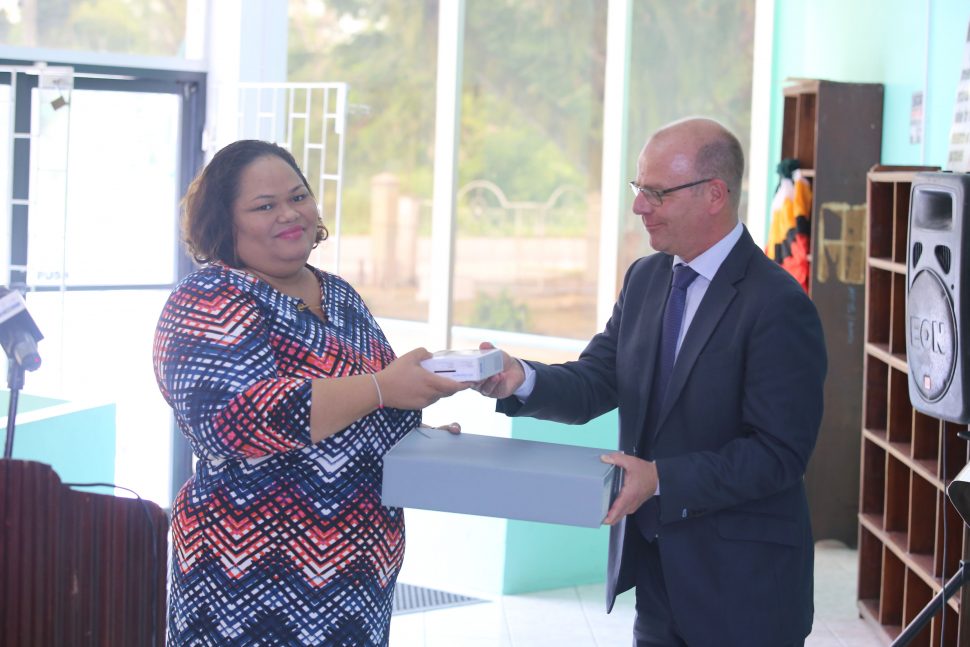Restored and digitised archival materials with, information spanning two centuries and dating back to the 17th century when Guyana became a Dutch colony, were yesterday handed over by the National Archives of the Netherlands to its local counterpart.
The handover was the culmination of a bilateral agreement between the two entities for the preservation and digitisation of Guyana’s 17th – 19th century Dutch Collection, which were in a bad state. The restored archival materials and digitised copies were handed over during a ceremony yesterday morning to National Archives of Guyana archivist Nadia Gamel-Carter by Arjan Agema, the Head of Digitisation of the National Archives of the Nether-lands. The ceremony also signalled the end of the three-phase project which included a training programme on the preservation of paper. The project cost amounted to 400,000 Euros.
In welcome remarks, Gamel-Carter thanked the Dutch trainers who conducted the training programme, as well as the team in the Netherlands who worked on conservation of the archival materials. She noted that as a former Dutch colony, the heritage is reflected in Guyana’s buildings, canals and other infrastructure, the names of places and streets, and in the way of life of people.
With a shared legacy in mind, she said, the two archives partnered on a number of projects, including two joint nominations for endangered archives on the UNESCO Memory of the World List. The nominations included the records of the Dutch West India and the Dutch East India companies. In between the Dutch West India records, she said, “you will find lots of interesting stories. It was worth the trip and it was worth the cost to make this collection available to the public.”
Tamika Boatswain, Director of Culture, in brief remarks, thanked the Government of the Nether-lands for “the invaluable’ assistance given to Guyana’s history and heritage and for the training is a country where the expertise in paper conservation is not readily available.”
Apart from the restored materials that were handed over, 89,000 scans on discs were also presented to the National Archives. Close to 100,000 scans of the materials were made and they are now available on the Netherlands Archives’ website.
Because of how damaged some of the materials were, Boatswain said, Government was pleased to receive the restored records as Guyana was at risk of losing the collection. Both Archives consider the archival records from the 17th century to 19th century as mutual cultural heritage, she said.
Meanwhile, Agema told Stabroek News that the three-year project involved the shipping of the materials to the Netherlands, their restoration, digitisation and a training programme in the preservation of paper. Twelve staff members from the National Archives, National Library, University of Guyana Library, the Deeds Registry and the Supreme Court Registry took part in the two-week training for paper preservation.
In giving the background to the project, he said that in 2001, a colleague of his was in Guyana doing some research as part of his studies and found that some materials of the Dutch West India Company, which ruled the colony during the 17th century, “were in a bad state.” He recommended the need to preserve the materials to the Dutch Archives.
“For us, the period on which the records are, is a very important one and it is not the most known period in Dutch history,” he said. “In Holland, it is not that known that in the 17th century, we were here in Guyana doing all kinds of things. Now that we have access to the archives, this period will also be better known to all of us in the Netherlands.”
In September, 2015, Agema recounted, he came to Guyana with “a large request” to the Guyana Government to “please take your cultural heritage to the Netherlands” to preserve it, to digitise it and make it available to all who are interested in it. He said they knew the materials “were very damaged and poor in quality.” A lot of people, mainly researchers and historians, are very interested in the materials, he added.
According to Agema, the Netherlands Archives was not sure of the response it would get. However, President David Granger “was very much in favour of giving us the opportunity to safeguard the materials. We shipped them to Holland and we took care of them.”
In their restored state, he said, the materials will not degenerate as much as they did before.
Happy that they could safeguard the materials, Agema said that they have already received positive reactions from researchers, who are now able to access information they could not get before. The copies, are not yet available on the Guyana National Archives’ website because the local infrastructure is not ready to accommodate it. However, there is a link to the Dutch website on the National Archives’ website.






